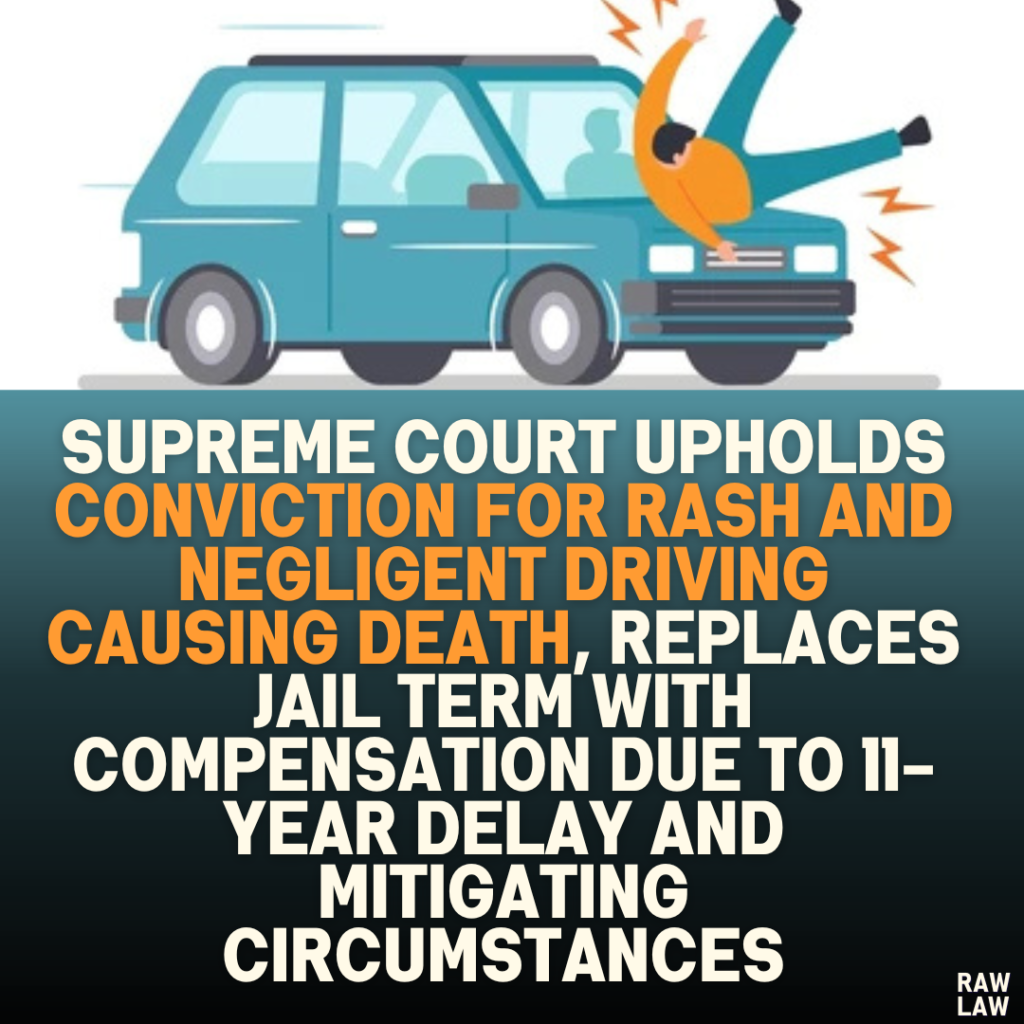1. Court’s Decision:
The Supreme Court upheld the conviction of the appellant under Sections 279 (rash driving) and 304(A) (causing death by negligence) of the Indian Penal Code (IPC). The appellant was held responsible for rash and negligent driving that led to the death of a pedestrian (Karthik) and six cows. However, considering mitigating factors such as the passage of 11 years since the incident and the appellant’s voluntary deposit of compensation, the Court set aside the imprisonment of three months simple imprisonment and monetary fines.
Instead, the Court ordered the compensation of ₹1,00,000 with accrued interest to be paid to the deceased’s mother under Section 357(3) of the Cr.P.C..
2. Facts:
- The Incident:
- On January 9, 2013, around 5:15 AM, the appellant was driving a lorry on the Nilakottai to Madurai road near Karigalan Petrol Pump.
- The lorry collided with a group of pedestrians and cattle. As a result:
- Karthik, a pedestrian, died on the spot.
- Six cows were killed.
- Prosecution Allegations:
- The appellant was driving rashly and negligently.
- The vehicle was allegedly transporting river sand illegally. However, the appellant was acquitted of charges under the Mines and Minerals (Development and Regulation) Act.
- Legal Proceedings:
- Trial Court: Convicted the appellant and sentenced him to:
- One-year imprisonment for causing death by negligence.
- Fines of ₹1,000 and ₹5,000 under Sections 279 and 304(A) respectively.
- Appellate Court: Confirmed the conviction and sentence.
- High Court: Modified the sentence to three months simple imprisonment and retained the fines.
- Trial Court: Convicted the appellant and sentenced him to:
- Appeal to Supreme Court:
- The appellant approached the Supreme Court, which granted interim protection and allowed the deposit of ₹1,00,000 as compensation for the victim’s family.
3. Issues:
- Whether the conviction under Sections 279 and 304(A) of IPC was legally valid based on evidence.
- Whether the sentence of imprisonment and fines was proportionate considering the mitigating factors.
4. Petitioner’s Arguments:
- Contribution of Circumstances: The appellant argued that the deceased and witnesses were handling a herd of about 70 cattle, which contributed to the accident.
- Time Lapse: Eleven years had passed since the incident, during which the appellant had been on bail and complied with court directives.
- Compensation Payment: The appellant voluntarily deposited ₹1,00,000 as compensation to the victim’s family, demonstrating his acknowledgment of the incident and remorse.
- Request for Leniency: The appellant requested a reduction in the imprisonment sentence, citing these mitigating factors.
5. Respondent’s Arguments:
- Eyewitness Testimonies: The prosecution highlighted that eyewitnesses (PW-1 to PW-3) consistently testified to the appellant’s rash and negligent driving.
- Clear Cause of Death: The prosecution rejected the defense’s suggestion that the cattle’s movement caused the accident, asserting that the lorry’s rash driving was the sole cause.
- Accountability: The respondent emphasized the importance of holding the appellant accountable for his actions.
6. Analysis of the Law:
- Sections Involved:
- Section 279 of IPC: Punishes rash and negligent driving that endangers life or public safety.
- Section 304(A) of IPC: Addresses causing death by negligence, punishable by imprisonment or fines.
- Section 357(3) of Cr.P.C.: Enables courts to order compensation for victims or their legal heirs, either in addition to or instead of other punishments.
- Judicial Principles Applied:
- The Court emphasized the importance of justice for the victim’s family, while also considering the mitigating factors:
- Long passage of time (11 years).
- The appellant’s acknowledgment of responsibility through compensation payment.
- The Court emphasized the importance of justice for the victim’s family, while also considering the mitigating factors:
7. Precedent Analysis:
The Court upheld the principle of balancing justice with mercy, as reflected in previous judgments:
- Upholding convictions to ensure accountability for negligence.
- Utilizing Section 357(3) of Cr.P.C. to focus on victim compensation over punitive imprisonment, particularly in cases involving prolonged litigation and mitigating factors.
8. Court’s Reasoning:
- On Conviction:
- The Supreme Court confirmed the findings of the trial court and High Court, based on consistent and credible eyewitness testimonies (PW-1 to PW-3) establishing rash and negligent driving by the appellant.
- The defense’s argument that cattle movement contributed to the accident was not supported by evidence.
- On Sentence:
- Passage of Time: The incident occurred in 2013, and 11 years had passed since then.
- Good Conduct: The appellant had been on bail throughout the litigation without any violations.
- Compensation Paid: The appellant voluntarily deposited ₹1,00,000 for the victim’s mother, showing remorse and responsibility.
- The Court opted to focus on restorative justice by prioritizing victim compensation over punitive measures.
9. Conclusion:
- The Supreme Court upheld the conviction under Sections 279 and 304(A) IPC.
- The Court set aside the sentence of three months simple imprisonment and the fines of ₹1,000 and ₹5,000.
- The Court directed that the compensation of ₹1,00,000, along with accrued interest, be paid to the deceased’s mother.
10. Implications:
- Restorative Justice Approach: The judgment demonstrates the Court’s inclination toward balancing punitive measures with compensation for victims in cases involving prolonged litigation.
- Accountability for Rash Driving: The conviction sends a strong message about adhering to traffic laws and ensuring public safety.
- Encouragement for Compensation: The judgment reinforces the use of Section 357(3) of Cr.P.C. to ensure justice for victims’ families through monetary compensation.




Pingback: Supreme Court Sets Aside 28-Year-Old Claim, Holds That Defaulting Allottees Cannot Seek Possession After Prolonged Delay; Mandates Fresh Auction for Plot Allocation to Ensure Transparency and Compliance - Raw Law